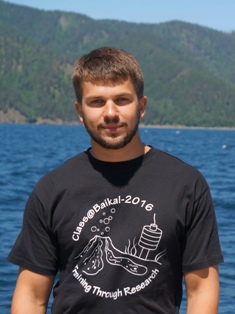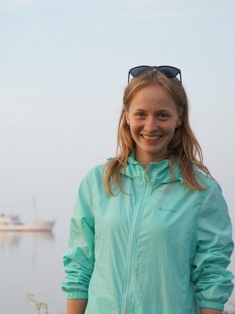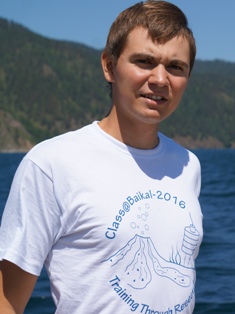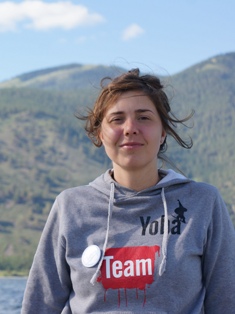Participants
Participants
Grigorii Akhmanov
Chief Scientist; Project Leader. Associate Professor of the Faculty of Geology of the Lomonosov Moscow State University; director of the UNESCO-MSU Training and Research Centre for Marine Geology and Geophysics; head of the UNESCO Chair of Marine Geology; member of National Oceanographic Commission of Russian federation
I am involved in marine investigation since 1993. Last three years Baikal is in the list of my most loved seas to go. Many times I have participated in different geological and geophysical marine expeditions, mainly in the seas of Atlantic and Arctic oceans. I took part in my first expedition, being a student of UNESCO-MSU Floating University. Nowadays I mostly participate in expeditions, taking responsibilities of Chief-Scientist or Deputy Chief-Scientist.
In our, already the third expedition of the Class@Baikal project I will be Chief Scientist as well. It means that I will be responsible for a co-ordination of the work of all teams of the expedition, I will take care for the best combination of training and research components of the cruise, I will plan a post-cruise processing of the data collected and, already, think and prepare the Fourth expedition of the project.
I am very pleased with results of previous expeditions of the project and with a development of the project in general. Only for two years we have overpassed the distance from the first shy steps to real discoveries and even certain specialization in studying geology of this great lake. The project gets own shape, trying to fit on the system which, for years, was being elaborated by UNESCO-MSU Floating University, legendary training-and-research programme in the field of marine sciences. I am very happy that these “shoes” (definitely, working shoes) of older brother are of good fit for us yet. I like very much scientific results – the phrase “for the first time” is in use in our reports, presentations and publications more and more often and always reasonably. I like that our students work with enthusiasm on the collected data also after the cruises, they feel a test of Science – many of them presented their works on scientific conferences (including international ones) and even were awarded with diploma and prices for the best student presentation. Young team of colleagues and friends is formed very naturally, in a course of the joint study. The Class@Baikal students discover own inter-disciplinary links, they help each other in laboratories and interpretation offices, they make common plans for future joint research – this is a basement of their future great scientific achievements.
Previous Class@Baikal expedition was remarkable for series of new intriguing objects, which were suggested to be included in a field of our interests by our kind guide into the geological World of Baikal, Oleg Khlystov, an expert from Limnological Institution of SB RAS, co-chief scientists of our expeditions. One of them is the Bolshoy mud volcano, where a unique combination of recent geological processes can be observed, and very interesting sedimentological analysis and genetic reconstructions can be made. Another is mysterious seep “St. Petersburg”, a “hard nut to crack” even for very experienced scientists. Amazing, large landslide in the “Krasny Yar” area – a good field for joint interdisciplinary work of sedimentologist, geochemist and engineering geologist. And many other objects. All brought to us a real pleasure to examine them during the expedition and afterward. During the cruise we had also several very interesting days of “hunting” for channels of the Khuray deep-water system. The beginning of scientific exploration of this system is a merit of the First Class@Baikal expedition. The system got own name in that expedition. And in 2015 we were working already on “our” object, thus, the dearest for us. And that was great!
Every year we learn a lot during our expeditions. On Baikal Lake we learn also some “baikalian” peculiarities of marine geology. Any scientific experience is always priceless, of course. But managerial lessons of every expedition are also very important. One of such lessons from previous Class@Baikal expedition is that our cruise legs should not be too short. It is very useful when a cruise can be subdivided into several parts (legs). But the shortest leg has to be not less than 6 days. On the contrary, very positive experience of the previous expedition is an experience of intensive using of the acoustic profiler not only during formally geophysical legs but also during legs fully focused on bottom sampling.
Also, in 2015, after the cruise we got an opportunity to stay all participants together in Listvyanka for a couple of days to be concentrated “hot on the trail” on initial scientific report preparation. It was a kind of on-shore continuation of the expedition. All together we were interpreting our “fresh” data, discussing and analyzing what we have obtained during the cruise. Already in two days we even have managed to organize a small conference/workshop where some experts from LIN SB RAS and Irkutsk technical university were invited to. Our Class@Baikal students presented their first talks on Baikal. This was an extremely important start for them, which was responsible for future success of analyses of obtained material. Very positive experience which we are going to develop.
Every day of an expedition is unique! Every day is worth to be appreciated in gold! Till now our “gold” was of the highest fineness. And the experience of two expeditions is already a “Gold Reserve”. We will try to increase this reserve during our Third Class@Baikal expedition. How are you, Baikal! We were missing you for year!
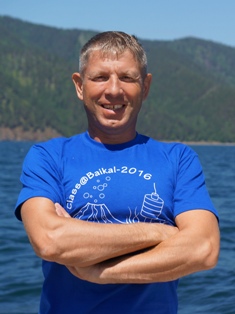
Oleg Khlystov
Chief Scientist. Head of the Laboratory of Geology of the Lake Baikal, Limnological Institute of Siberian Branch of Russian Academy of Sciences.
My interests: geology, marine geology, relaxation, family, activity holidays, skis, etc.
Have you already been in sea expeditions? Yes. It is my 26th field season. I was two times in the Sea of Okhotsk (2004), once in the Mediterranean Sea (2016)
What will you do in this expedition? (your tasks) The management of expedition, bottom sampling, sediment temperature measurement .
Are you been encouraged by results of last year expedition? Yes and no. We could work more and better in the geophysical leg.
Write, please, about the day/situation/moment which was been most remembered for you from the last expedition.
The previous expedition to Baikal was remembered by new people, new methodologies. In general we had a lot of good interesting moments, very difficult to put first things first.
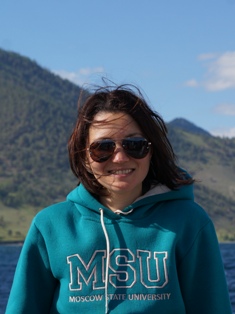
Svetlana Korost
Head of geological group. Researcher of the Department of Petroleum Geology and Geochemistry, the Faculty of Geology, the Lomonosov Moscow State University
I'm interested in the petroleum lithology and the sedimentology. I am engaged in studying of rocks which were formed millions years ago, in restoring the history of their accumulation and transformation. However only understending of contemporary processes happening on the Earth can help to explain the past
In this expedition my main task is a coordination of work of geological team. I'm going to participate in the process of bottom sampling, to help to students descript sediments. I participated in the last expedition Class@Baikal - it was amazing experience. For many participants the results of expedition-2015 were usefull for writing their graduation works.
It is very complicated to put attention to one moment from expedition, they were a lot: fresh air, pure water, burning ice, amazing «omul» (kind of fish). But one I know for 100%, I will use all possibility to come back to Baikal.
Jeffrey Poort
Expert, Geological group. Senior Researcher at the Institute of Earth Sciences in Paris (ISTeP), University Pierre et Marie Curie (UPMC), Sorbonne Universités, France
I am a marine geologist at the University Pierre et Marie Curie (UPMC, Sorbonne Universités) in Paris, France. My scientific interest is on geothermal processes in sedimentary basins, from lithosphere scale to local fluid related processes. In my free time, I love to spend time with my family, go to concerts and sit with a good Belgian beer on a Paris terrace. During the Euro and World soccer tournaments, I love to watch the games with friends and support the Belgian, Russian and French national teams. I have participated in many expeditions around the world, such as in the Sea of Okhotsk, the Black Sea, the Mediterranean Sea and the Caraibean Sea. On Lake Baikal I have participated more than ten times, and it is one of my favourite places and certainly one of the most beautiful places in the world.
During the Class@Baikal-2016 expedition, I will focus on the particular thermal field near seeps, mud volcanoes and gas hydrate deposits. I will attach temperature sensors on the gravity corer and try to measure the thermal gradient in the sediments. The purpose is to better understand the migration and expulsion of fluids and gas and the formation and dissociation of hydrates.
I really enjoyed the previous Class@Baikal-expeditions, which I think were a great success for science and for training. We got some new ideas on seep dynamics which we presented on different international conferences (EGU, AGU, MARESEDU, etc.). The participating students have always been very motivated, and the training team very professional.
There were a lot of memorable and intense moments during the cruise of 2015 (first hydrates of the cruise, first rhizon fluid extraction test, bottle skating disco, celebrating THP measurement nr. 100, etc.), but my favorite is still the picnic at the end of the expedition, a joyous moment together on the beach of lake Baikal with a short swim in the cold water.
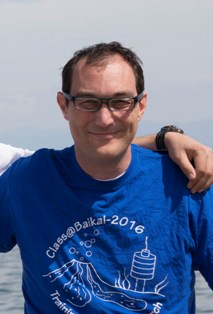
Giovanni Aloisi
Expert, Geochemical group. University Pierre et Marie Curie (UPMC), Sorbonne Universités, France
I am a geochemist from the French CNRS (Centre National de la Recherche Scientifique) working at the Université Pierre et Marie Curie in Paris. I am interested in using isotopes of natural substances (water, xater vapor, carbonate and sulphate minetals, gases..) as tracers of natural biogeochemical and physical processes, for example the oxidation of methane in marine sediments, the formation of evaporite minerals in evaporitic basins an the evaporation from the ocean. I love going o marine expeditions, walking in the mountains and taking photos (still with a rollfilm camera!).
I have participated to about 12 expeditions on scientific vessels as a sedimentologist and a geochemist. I was lucky to visit the Black Sea, Mediterranean Sea, North Atlantic and Sea of Okhotsk – and now the largest Lake on Earth!
I am interested in studying the isotope composition of sediment pore waters looking for the signature of gas hydrates. On board I used rhyzon samplers to extract pore waters from Baikal sediments. I will bring them back and analyse them in my Paris laboratory.
I was not on board last year but I had the chance to analyse pore water samples that were collected from methane seepage areas of the Baikal during Class@Baikal-2015. The results are encouraging and this year we collected many more samples to test our ideas on the isotope signature of gas hydrates. I can say something about Class@Baikal-2016 which gave me plenty happy moments and impressions. I can think of three: finding old friends and making new ones, discussing with students on geochemical data and drinking Baikal-Lambrusco!
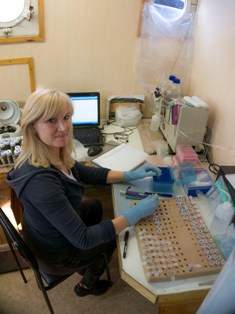
Pogodaeva Tatyana
Expert, geochemical group. Researcher of the Laboratory of Hydrochemistry and Chemistry of Atmosphere, Limnological Institute of Siberian Branch of Russian Academy of Sciences.
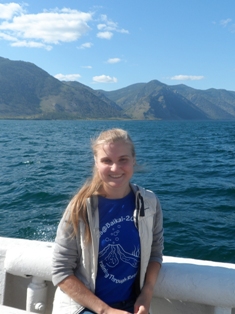
Solovieva Marina.
Leader of Geophysical team. Master of geology (marine seismology).
This year I graduated from the magistracy of the department of seismometry and geoacoustics of
In my free time I like to travel around the interesting areas of
In this expedition, my main task will be planning points for bottom sampling, and in the second part of the trip I will work with the profiler and make interpretation of obtained data.
In two previous Class@Baikal expeditions a significant amount of geological and geophysical data was obtained, which helped me to prepare and successfully defend a master's dissertation and to participate at several international conferences. In addition, in these expeditions I have obtained invaluable experience observing the work of the geologists and sampling process, saw the mysterious gas hydrates for the first time, touched the Baikal bottom and discovered its structure.
I'm sure that the upcoming expedition will be as interesting and informative as the previous ones, and Baikal will bring new surprises!
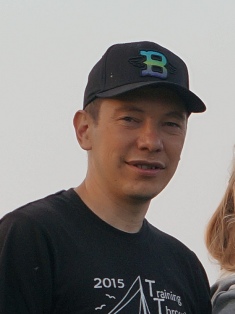
Andrey Khabuev
Geophysical team. Senior Engineer of the Laboratory of Geology of the Lake Baikal, Limnological Institute of Siberian Branch of Russian Academy of Sciences.
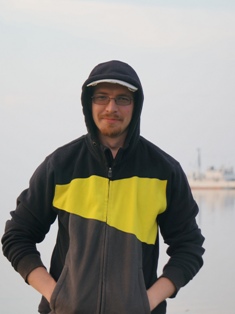
Kirill Grigoriev
Geophysical team. Electronics Engineer of the Institute of Physics and Engineering of the Irkutsk National Research Technical University
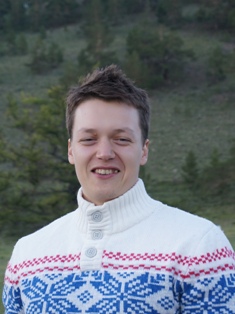
Kazakov Andrei
GIS specialist. Limnological Institute of Siberian Branch of Russian Academy of Sciences.
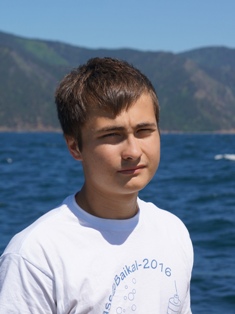
Artur Kudaev
Leader of Sedimentological team. Undergraduate student of the Department of Petroleum Geology and Geochemistry, the Faculty of Geology, the Lomonosov Moscow State University
I’m 5th year student of Lomonosov MSU. I'm interested in different geological processes which activities can be observed in our days, in particular that relates with hydrocarbons. I like physical training, read the classical literature. I travel and spend time with darling girlfriend. I’m just live.
Only once I have been in this expedition, and I will repeat this experience for the second time under the guidance of experienced researchers – Akhmanov G.G. and Khlystov O.M. Now I'll be the head of the detachment, under my responsibility is work of younger students. It is important for me. I am glad that I have the important duties for the whole team.
Past Expedition Class@Baikal - staffed in one week experience marine geologists in friendly company, communication with scientists and experts, the moments when a look is dissolved in the beauty and grandeur of Lake Baikal. Material obtained by the expedition of 2015 was enough to study it in a tomographic scans (my favorite studies) and even helped to establish a new element of sediments structure that adds me confidence in further studies as a beginning researcher of natural mysteries (through science).
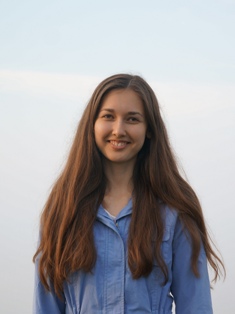
Gulnaz Karamova
Leader of Geochemical team. Undergraduate student of the Department of Petroleum Geology and Geochemistry, the Faculty of Geology, the Lomonosov Moscow State University
I am bachelor of geology. My specialization is "Geology and geochemistry of oil and gas". The sphere of my scientific interest is geology petroleum geochemistry and geochemistry of hydrocarbon gases in particular. In free time I like drawing as well, I graduated art school. This trip is the second for me, because I took part in the expedition Class@Baikal-2015. During the expedition I will study geochemistry of hydrocarbon gases and will take part in sampling process and in extraction free gas from the sediments for its further learning in the laboratory at Moscow State University. During the last year expedition, I got invaluable experience - mastered degassing method «Head-space», learned to interpret the anomalous field of hydrocarbon gases, also learned to work as a team that is the key to a successful expedition. Over the years I have participated in various conferences, where I performed with the scientific works on Lake Baikal study. And, of course, due to last year's expedition I saw Lake Baikal with my own eyes is one of the wonders of the world - the most clean and beautiful lake.
Visited Baikal once, I want to come back to this amazing beauty of the place.
Vorobiev Rodion
Sedimentological team. Student of the Department of Petroleum Geology and Geochemistry, the Faculty of Geology, the Lomonosov Moscow State University
Kislitcina Ekaterina
Geochemical team. Student of the Department of Petroleum Geology and Geochemistry, the Faculty of Geology, the Lomonosov Moscow State University
I am a student of the Moscow State University and study on 3-rd course at the Petroleum Geology Department. Now I am in search of my geological interests. Although most of all I´m interested in such disciplines: as geochemistry, marine geology and petrophysics. Also I fond of playing the violin and singing. I try to participate in the organization of various events not only at the University, but also at voluntary organization "United with space". I'm part of a group engaged in the geochemical study of gas and gas hydrates. My job will be to collect and analyze the materials. I will visit the lake Baikal at first time. I imagine this expedition like a great scientific adventure. Frankly speaking, I had never been to such expeditions, but I think it would be a good experience for me. I think I will be able to develop my skills and knowledge not only in the scientific field. I hope I can find there great friends and good teachers.
Balakin Igor
Sedimentological team. Student of the Department of Petroleum Geology and Geochemistry, the Faculty of Geology, the Lomonosov Moscow State University
My name is Balakin Igor, I`ve finished the third course of the Geological Faculty of Moscow State University Department of Geology and Geochemistry of Fossils, my interests connect with researching formation and accumulation of hydrocarbons. I also try to know something new in geological theme. In addition I found of swimming, going to the circle and another active hobbies.Yes, at the end of May this year, due to Grigorii Georgievich Akhmanov I with my friend Rodion took part in expedition on the Onega lake, where we welcomed with life on the little science`s vessel. The goal of expedition was taking the sediments from lake`s base. We also trained to work with geophysics’ equipments. We tried to understand the process of taking sediments; we took the description of kern and measured some parameters. We relaxed in the shore of Onega and worked in the vessel. This fact is different between our past expedition and our trip to the Baikal. It was my first experience in taking part in same expeditions. It was really interesting for me to know something, which was hidden from our eyes.
It was the single expedition in this theme. I really don`t know, because I haven`t take part in same expedition. But I sure, that I will upgrade my skills in description and taking sediments due to my teachers. Of course, I ready to do anything, in which my teacher need. Yes, it will be my first experience. Unfortunately, I hadn`t opportunities.
I imagine, that we will float to the planed plate, on which we will accomplish operations of the descent and ascent the sediment`s taking equipments, descript the sediments, make the suggestions about situation of accumulation in which this sediment formed. I hope see the gas hydrates, in which I really interested, because I sure, that it is so important for fossil`s geology. We will get pleasure from the beautiful view of rising sun and very pure water of lake.
I expected the new good emotions, acquainted with new people; due to them help I will update my knowledge and skills. I hope that I will see the greatness of Baikal Lake, in which I will dream to be. I heard about Class@Baikal from my oldest friends, they was excited and advised me to travel to Baikal. Later Grigorii Georgievich Akhmanov told about this program. From his interested lection we learn about long and full of difficult and fun history of Class@Baikal. He also told, that we will have the great opportunity: based on material, took on the expedition, we can try to write article, which will publish in scientific magazine. After this my desire became bigger. I decide that I want to obtain new emotions and knowledge. I also think, that every people want to see the biggest lake in our country, want to sense himself he part of nature and proud him desire.
Nesmeyanova Ekaterina
Media-group
| graduation work |
